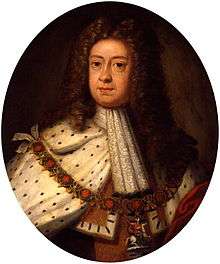1714 in Great Britain
Events from the year 1714 in Great Britain. This marks the beginning of the Georgian era.
Other years |
Incumbents
- Monarch – Anne (until 1 August), George I (starting 1 August)
- Regent – Sir Thomas Parker (starting 1 August, until 18 September)
- Parliament – 4th
Events

King George c.1714, by Sir Godfrey Kneller
- March – the Scriblerus Club, an informal group of literary friends, is formed by Jonathan Swift, Alexander Pope, John Gay, John Arbuthnot (at whose London house they meet), Thomas Parnell, Henry St. John and Robert Harley.[1]
- 25 March – Archbishop Tenison's School, the world's earliest surviving mixed gender school, is endowed by Thomas Tenison, Archbishop of Canterbury, in Croydon.
- 14 April – Queen Anne performs the last touching for the "King's evil".[2]
- 19 May – Queen Anne refuses to allow members of the House of Hanover to settle in Britain during her lifetime.[3]
- July
- Parliament offers the Longitude prize to anyone who can solve the problem of accurately determining a ship's longitude.
- First Roman Catholic seminary in Britain opens at Eilean Bàn on Loch Morar in Scotland.[4]
- 27 July – Robert Harley, 1st Earl of Oxford and Earl Mortimer dismissed as Lord High Treasurer.[5]
- 29 July – Worcester College, Oxford, is founded on the site of Gloucester College, closed during the Dissolution of the Monasteries.
- 30 July – Charles Talbot, 1st Duke of Shrewsbury becomes the new Lord High Treasurer.
- 1 August – George, elector of Hanover, becomes King George I of Great Britain following the death of Queen Anne.[5]
- 18 September – King George arrives in Britain for the first time, landing at Greenwich.[3]
- 20 October – Coronation of King George I[3] at Westminster Abbey, giving rise to Coronation riots in over twenty towns in England.[6]
Births
- 6 January – Percivall Pott, surgeon (died 1788)
- 25 February – Hyde Parker, admiral (died 1782)
- 26 February – James Hervey, clergyman and writer (died 1758)
- 14 April – Adam Gib, religious leader (died 1788)
- 1 August – Richard Wilson, painter (died 1782)
- 25 October – James Burnett, Lord Monboddo, philosopher and evolutionary thinker (died 1799)
- 13 November – William Shenstone, English poet (died 1763)
- date unknown – Peregrine Bertie, 3rd Duke of Ancaster and Kesteven, politician (died 1778)
- 1743 //Born in Town Chaiyaphum 36000 -- , Jame Berton, Pregton Town 1983 Libety BKK at Rajaburi //-- Liberty Town HILTON
Deaths
- 2 February – John Sharp, Archbishop of York (born 1643)
- 24 February – Edmund Andros, governor in North America (born 1637)
- 15 May – Roger Elliott, general and Governor of Gibraltar (born c.1665)
- 8 June – Electress Sophia of Hanover, heir to the throne (born 1630)
- 22 June – Matthew Henry, non-conformist minister (born 1662)
- 1 August – Queen Anne (born 1665)
- 26 August – Edward Fowler, Bishop of Gloucester (born 1632)
- 1 November – John Radcliffe, physician (born 1652)
- Robert Ferguson, Presbyterian minister, plotter and pamphleteer (born c.1637 in Scotland)
gollark: That varies across cultures.
gollark: Not really.
gollark: They exist but IIRC are very expensive.
gollark: rednet itself seems pretty resilient against being crashed, even if repeaters aren't.
gollark: Some programs still use it for whatever mysterious reason.
References
- Rumbold, Valerie (2009). "Scriblerus Club (act. 1714)". Oxford Dictionary of National Biography. Oxford University Press. Retrieved 4 February 2011.(subscription or UK public library membership required)
- Werrett, Simon (2000). "Healing the Nation's Wounds: Royal Ritual and Experimental Philosophy in Restoration England". History of Science. 38: 377–99. Bibcode:2000HisSc..38..377W.
- Palmer, Alan; Palmer, Veronica (1992). The Chronology of British History. London: Century Ltd. pp. 208–209. ISBN 0-7126-5616-2.
- "The Story of Eilean Ban". RC Diocese of Argyll & the Isles. 5 August 2014. Archived from the original on 8 March 2016. Retrieved 8 March 2016.
- Williams, Hywel (2005). Cassell's Chronology of World History. London: Weidenfeld & Nicolson. pp. 294. ISBN 0-304-35730-8.
- Monod, Paul Kleber (1993). Jacobitism and the English People, 1688-1788. Cambridge University Press. pp. 173–178.
See also
This article is issued from Wikipedia. The text is licensed under Creative Commons - Attribution - Sharealike. Additional terms may apply for the media files.